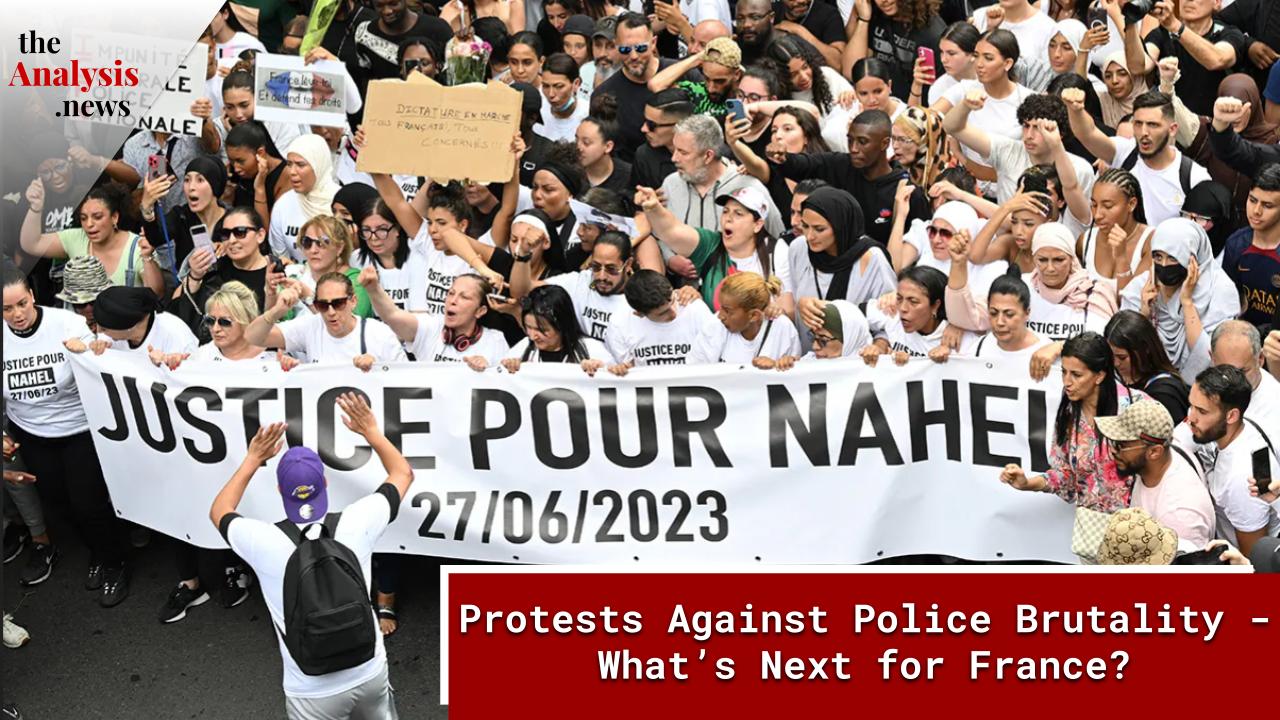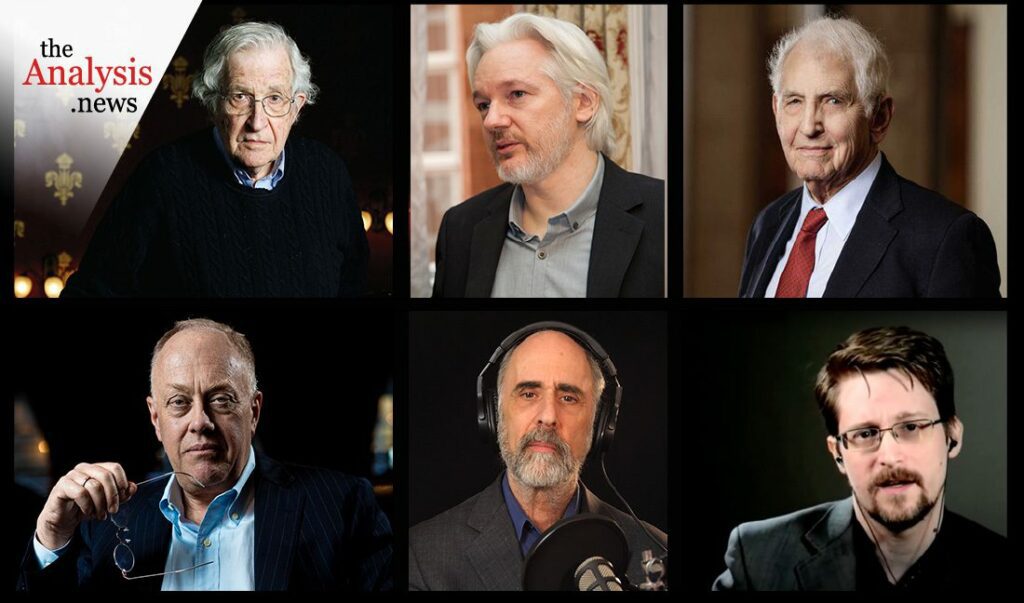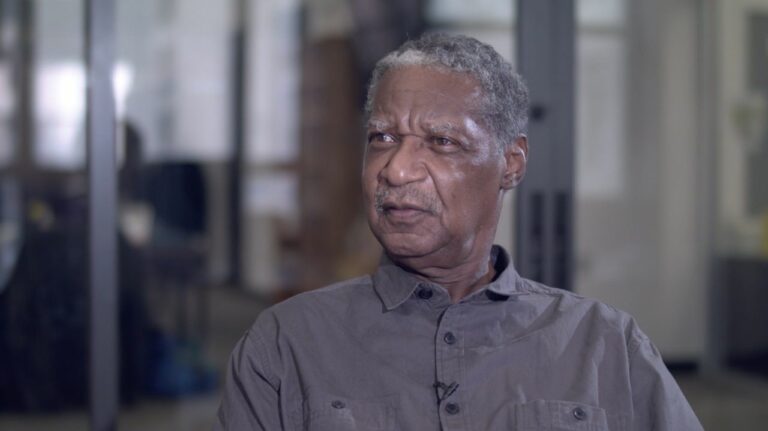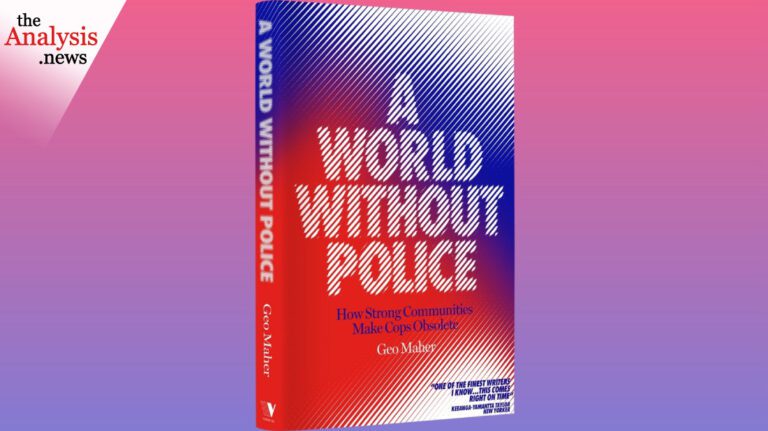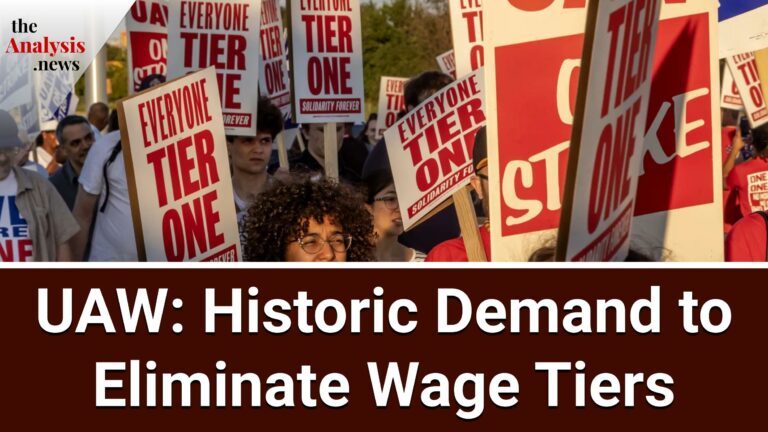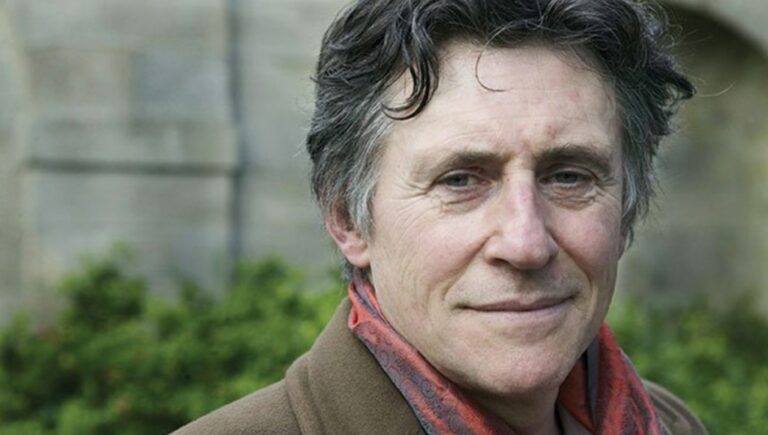Yasser Louati, political analyst and Head of the Committee for Justice and Liberties, highlights the brutal practices of the French police, as well as the proximity of the police unions to Marine Le Pen’s right-wing ideology. He discusses how French secularism, or laïcité, has been instrumentalized against racialized groups and minorities. Furthermore, he argues that France is at a crossroads; as seen in the anti-pension reform protests, different groups from the fringes of French society are uniting to protest the neoliberal state, as well as its policies which sustain religious and racial discrimination and the increased alienation of the poorer classes. Will French society keep fighting for justice and rise up against the regime, as it has done in various movements in the past?
Talia Baroncelli
Hi, I’m Talia Baroncelli, and you’re watching theAnalysis.news. I’ll shortly be joined by political analyst, Yasser Louati, to speak about the tragic killing of Nahel Merzouk, a 17-year-old in France. We’ll be speaking about police brutality and the legacies of colonialism.
If you enjoy this content, please don’t hesitate to go to our website, theAnalysis.news, and hit the donate button at the top-right corner of the screen. You can also get onto our mailing list; that way, you’re notified every time there’s a new episode. Go to our YouTube channel, theAnalysis-news. Subscribe to the channel and like all the videos you want to watch. Be back in a bit with Yasser Louati.
Joining me now is Yasser Louati. He’s a political analyst as well as the Head of the Committee for Justice and Liberties. Thank you so much for joining me today.
Yasser Louati
My pleasure.
Talia Baroncelli
Well, I wanted to have you on to speak about several issues, particularly police brutality in France, as well as racism and entrenched inequality. We’ve seen the French police be historically extremely violent within Western Europe.
A few weeks ago, there was a tragic shooting, the fatal shooting of Nahel Merzouk, a 17-year-old who was shot at point-blank range in his car at a traffic stop in Nanterre. Initially, the French police said that the police officer was defending himself. A video was revealed that contradicted this story and showed that Nahel was innocent, and the police officer has been charged since then. Maybe you could speak about the response on the streets and the anger of this tragic incident.
Yasser Louati
Well, initially, we have to keep in mind that the government actually stood with the policeman by using traditional talking points. He was defending himself, and he was in danger. Then, of course, mainstream media rooted for the policeman, first by saying he was in danger and then, of course, portraying his victim as dangerous. We’re talking about a 17-year-old kid who was unarmed and who had previously been beaten by the same police officer. It turned out that as he was fainting in his car, he released the brakes, his automatic car moved forward, and the policeman shot him.
The outburst of anger the world has witnessed is due to this lie that was again used to protect the policeman. This is not something that’s, I’m going to say, happening rarely. It’s every single time. I think we see the same patterns taking place in the U.S. and the U.K., to name a few. Government and mainstream outlets stay with the policeman, especially if he’s against a Black or Arab person. The victim is portrayed as threatening an innocent police officer.
Of course, the people who arose and took to the street actually identified with the victim of the policeman. People did not wait for the justice system to come into place because we have a long history of the justice system in France, most of the time clearing the names of the policeman or giving them minimal sentences. This is what we call [inaudible 00:03:44]. If you do it again, you might get tried and go to jail. Other than that, we have not seen the government keeping the police in check, let alone siding with the victim’s family and showing empathy that it could have been any Arab or Black family’s kid being shot at point blank.
Talia Baroncelli
This particular officer was awarded with all sorts of different police awards. He had risen so high within the ranks. Is this surprising that he committed this crime, or is it actually an indication of how, if you’re more brutal within the police force, then you’ll actually be more respected?
Yasser Louati
Well, we have seen several policemen being decorated after having been tried for acts of police brutality. It happened in the past. We have seen people that we were expecting the government to dismiss or at least dishonor and kick out of the police force. Let’s not be ambitious and hope they would jail them for decades, but at least kick them out of the police force. In return, though, they were put aside in a closet for some years, and then you hear about them a couple of years later, and they are being promoted and becoming officers, if not senior officers. That is already a problem. It shows that there is almost an absolute lack of accountability within the police force in France– we can come back to that later– with the way the police self scrutinizes its force.
Also, the doctrine adopted under Emmanuel Macron, for example, you have seen the change in the way the police interact with demonstrators. It is not like countries like Germany; it is not about keeping people at bay or maintaining order; it is about crushing bones and skulls. The demonstration of this change of doctrine, doctrine de maintien de loi, the doctrine of peacekeeping, of all public order is like during the Yellow Vests episode, as during the anti-pension reform episode, it is about brutally repressing people to scare them away. So when the government maimed children and ordered people during the Yellow Vest demonstration and the anti-pension reform demonstrations, it was to send them a message. If you come, this is the risk you are taking.
In the case of the Banlieue, the so-called ethnic neighborhoods of France, where the Blacks and Arabs have been concentrated during the housing policies of the 1960s and ’70s. In those neighborhoods, the police are perceived as an occupying force, not as a force to protect and serve. In study after study, we see that the police force has a profound problem of racism, which is made even worse by the lack of acknowledgement by successive governments.
We have to tell your international audience if you’re Black or Arab in France, you are 20 times more likely of being stopped by the police. You add to it the fact that this police [force] is the deadliest one in the continent of Europe. Twelve people were killed last year alone at traffic stops, and only one in 10 years in Germany. This is a profound problem that you are seeing in the Nahel episode. Unfortunately for me, as a French citizen, it won’t be the last one, and it is not the first one.
Certainly, we can talk about the history of police killings in France against Jews, against Blacks, against Arabs, and against their leaders. Unfortunately, we do not see any acknowledgement of the problem, and we do not see political will, let alone courage or integrity, to address the issue and say, all right, can we redefine the role of the police? Can we put in place systems and mechanisms of checks and balances when the police go astray from their mission?
Talia Baroncelli
Well, we will get to the colonial histories of France and its colonial legacy and how that plays out within the French police force itself, but I do want to speak about a reform from 2017. I’m not sure if that’s what you were referring to, but the reform I’m thinking of is the Penal Code Reform 435-1, which essentially sets out five different instances in which a police officer may engage, may use their weapon and actually shoot someone. I feel like since then, there have been increases in refusals to comply with police officers. I’m wondering if you think that maybe this particular law has created these situations in which there could be fatal interactions because this gives more discretion to police officers in terms of when they can use their weapons.
Yasser Louati
Well, the article you mentioned for 435-1 of the Homeland Security Code was passed in 2017 during a socialist administration, François Hollande, after heavy lobbying by the police unions. Before we even speak of this piece of legislation, we have to put things into perspective.
Police unions have dramatically shifted towards the alt-right if not the far-right. The main police union, Alliance Police, is closer to Marine Le Pen and Éric Zemmour than it is to, for example, the Socialist Party, which wasn’t the case a couple of decades ago.
We already see that the far-right agenda has entered the police force and has structured the police force around far-right ideology. As a matter of fact, over 52% of the police force voted for Marine Le Pen in 2017. Other studies within the military police, the so-called gendarmerie, show a similar trend. We are already in a situation where the ideology that governs the police or represents it before institutions is far more compatible, to say the least.
Now, these unions have been lobbying for an ever more widening of the definition of self defense. This piece of legislation is exactly that. If you do not stop at that traffic stop, if the police officer deems that his life is in danger, he can use deadly force. Even though the wording is a bit more precise, let’s not paint everything dark. It was about absolute necessity; if the policeman or woman’s life is in danger, if there is no other recourse, yes, they can use it.
The problem is the Ministry of Interior and the police itself, its officers and senior officers; they adopted a very loose definition of that legitimate defense. That is why we see much higher numbers with the police than with the gendarmerie or the military police, which are present in smaller towns, whereas the police are mostly present in urban areas. However, this trend is not stopping.
We see calls from Marine Le Pen, the far-right, and people like Éric Ciotti from I Repubblicani, which was the mainstream conservative party; they are calling for a presumption of self-defense, which means by default, when policemen or women kill someone, by default, they are in a situation of self-defense. It would be on the victim to prove otherwise. That is where things are being pushed or the direction in which policy and regulation are being pushed.
At the same time, we have not seen Emmanuel Macron, let alone his current Minister of Interior, Gérald Darmanin, putting an end to this rift. You could say that the police force has a tradition because the national police, as I said in many other interviews, the current national police, as we know it, was set up under the Vichy regime, who had worked with the Nazis and welcomed them during the occupation period.
Now, this police force, let’s say it was inertia; it was impossible to reform it. Let’s go along and be the devil’s advocate. We have not seen governments coming from the Left, the center, or the traditional conservative party oppose this drift toward the far right. Unfortunately, the fact that the government has not supported the victim’s family, the family of Nahel, and did not condone a fundraiser that raised €1.6 million within a couple of days for the killer of Nahel, says a lot about where the government stands, whether it speaks publicly or not.
Talia Baroncelli
Well, you bring up a few very important points, namely how you say the centralized police force was set up by Marshal Pétain, I think, on April 23, 1941. To push back, police brutality in France was a thing even in the late 1700s. In 1848, there was a week when over 10,000 people were killed. You could argue that it was against poor white French people and that the incidents now are primarily against Black and Arab French citizens or people in the country. Is it fair to put some of this violence saying that it has its roots in the Vichy regime and the Collaborationist regime? Can we maybe tie some of these incidents to the birth of the French Republic, essentially?
Yasser Louati
Well, let’s take a look at who the police were historically. It has always been about protecting the regime, not the people, not the widow and the orphan, ‘la veuve et l’orphelin,’ as we say in French, from inception, before the Vichy era. What the Vichy regime did was centralize everything, like any authoritarian regime at the time, centralize the police, which was usually part of the department. Now, it was a centralized entity.
However, the reason why I keep bringing the genesis of the modern-day police to the Vichy era is because the police were never purged from their Vichyite roots. The collaborationists who worked with the Nazis, two of them were very famous. René Bousquet, who promised a hundred thousand Jews to Carl Oberg, the head of the S.S. in France, was never sacked. He even continued a successful career in the press, the banking industry, and even tried to run for election again. He was never tried. Maurice Papon, who ordered the killing of hundreds of Algerians on the 17 of October in 1961, had rounded up the Jews in the Southwest of France in 1942 as well.
How come these two individuals remained in the police force for decades without being tried? It took the work of historians, investigators, and journalists to bring up their track records for them to be tried. René Bousquet was killed in 1993 by a person who wanted to take matters into his own hands. He was never brought to court.
Yes, the police have historically been about protecting the regime, out of its nature. In the case of Police Nationale, we can go back to 1941 and say, all right, let’s say it was a dark chapter in the history of the French police. What happened after 1945 in the liberation of France? How come we did not purge it? How come we did not reform it? We’re talking about working with the enemy. We’re talking about rounding up French citizens. This did not bring about police reform.
So today, when we confront racism within the police, we have to go back one decade before, and we find that the police since 1941 was never a true Republic to serve and protect. It was there, again, to protect the regime. Now we have Blacks and Arabs, and we accepted the idea that Jews could be rounded up by the State’s armed or civilian armed branch. Well, now we have the right to ask, when are we going to reform the police? Are we going to address the DNA of this institution called the Police Nationale?
Talia Baroncelli
Well, la Police Nationale or the National Police, as you mentioned, it falls under the jurisdiction of the French Interior Minister and the Head of the Ministry, Gérald Darmanin. Whereas the gendarmerie, they operate more in the rural areas of France. What has Darmanin’s specific response been? Is he trying to placate the National Police because he knows that the unions are so right-wing and that there’s immense support among them for Marine Le Pen? Is he maybe scared that he can’t really put certain reforms into place? What’s going on with him? What can we expect from him?
Yasser Louati
Well, we have two issues when it comes to the Minister of Interior. First, the government has covered itself so much and has developed French society so deeply that the only thing standing in line between the government and the people is the police. The police protected the regime through the Yellow Vest episode, during the anti-pension reform, and the government knows how much it owes the police. So much so that when the predecessor of Gérald Darmanin, Christophe Castaner, said, “I do not know a policeman who isn’t responsible for police brutality,” just to paraphrase him. When he dared to mention the hypothetical possibility of some policemen and women being racist, he was sacked within 48 hours. That’s how much weight these unions have.
Now the police as such, when it comes to Gérald Darmanin as a person, he is coming from the traditional royalist ultra-conservative Right. He doesn’t come from the center-right like [inaudible 00:19:11] or Jacques Chirac. He is coming from a very close fringe of the Right that is very porous with the far right. So much so that Gérald Darmanin, a couple of years ago, accused Marine Le Pen of being “too soft, not on Islamism, but on Islam.” So you have the current Minister of Interior accusing the far-right leader of being too soft on France’s Muslim minority.
How can we, in these conditions, expect the government to even address any problem within the police? I think the first or the second night of the uprising after the killing of Nahel, the main police union, again, Alliance Police published a blasphemous press release speaking of undesirables, using the language of civil war, and threatening the government that if it does not acknowledge this current situation, the police will do what it has to do.
NGOs had been shut down for calling out Islamophobia. NGOs had been shut down for demonstrating against pro-oil and pro-intensive agriculture lobbies. This police union is threatening the government. Macron and Gérald Darmanin did not even address the fact that a police union threatened the government in place. So that is why we have to steer clear of any hopes that might lead us to a demagogical situation. It would be pure demagogy to say the French Republic will reform the police, especially with Macron in place. It won’t happen, unfortunately. The responsibility lies on the shoulders of any French citizen, man or woman, who have any sensitivity towards human rights, civil liberties, and who doesn’t want to see a state within a state in the form of the police.
Talia Baroncelli
It seems like they’re trying to outdo each other with their rhetoric—both President Macron as well as Darmanin and these right-wing police unions. I’ve seen statements where Macron has essentially said that in order for there to be the rule of law, they need to enforce this police state, police brutality, that the oppression of protesters is actually necessary in order to maintain the rule of law, which to me seems very twisted and is in actual fact completely opposed to the letter of the law if you want to call it that.
Why don’t we speak about French law, civic nationalism, and secularism in France? I think this also leads to a lot of the issues of racism and inequality today in France. In 1905, this idea of secularism, or laïcité, the separation between the church and State was codified. Since then, it seems like it has been used as a tactic to be weaponized and instrumentalized against Muslim communities and against Black communities who appear to be different. They appear to be culturally different. It has prevented them from expressing freedom of religion in public spaces. So maybe we could speak about how French law itself disregards the rights of minorities.
Yasser Louati
Well, first, to this notion that these Blacks, these Arabs, these Muslims, these Romans, or these Jews, their history, unfortunately, is not that bright when it comes to France. When we speak about this cultural difference, I always ask in return, what is the benchmark for French culture? I’m from Paris, born and raised. I know my culture is fundamentally very different from a similar Yasser Louati, born in Marseille or born in Lille in the north. French culture is not a monolithic entity. Our culture varies according to geography and, of course, according to time.
When I ask about the benchmark for French culture, I get a blank response because people don’t know how to define it. What they mean by that is anything that is not white and or Catholic. The problem is even French people are not predominantly Catholic anymore. Many are agnostic; many are atheists, etc.
Now, coming to the codification of the secular law in 1905, France had a bloody history when it came to the relationship between religions, especially between Protestants and Catholics. The Protestants were massacred, of course, during St. Bartholomew’s Day, the Dark Night. Then, of course, throughout decades to follow, we had some relative peace. However, the validator of the absolute monarchy in France was the Catholic Church. The initiators of the French Republic and those who carried the torch in subsequent years had a project to separate politics from religion to keep the state and governmental affairs away from the Catholic Church. This struggle lasted for about two centuries until 1905. That law was actually a pacifying law because it kept the Catholic Church away from public policy. It gave full freedom to the Catholic Church. But for minorities, this was very welcome because it meant that now the state was supposed to be neutral. We forgot about this law for decades.
When Muslims became visible in the public space through headscarves on Muslim women in schools and public spaces, people used that piece of legislation which was about freedom and equality. They used it to weaponize it and redefine what laïcité means. We went from the neutrality of the state of the government to the neutrality of individuals in the public space. That’s how vicious, and that’s how twisted the people behind it were.
This means instead of having a neutral Republic which does not acknowledge religion, which would be good for any religious minority or majority, now they go after Muslims and say laïcité is about having you disappear from public space. The fact that many people in France, unfortunately, accepted the idea that a fundamental law of 1905 could be redefined for racist, misogynistic purposes has opened Pandora’s box for more legislation to be reinterpreted and weaponized.
So much so that today, since 2004, France has banned the wearing of the headscarf in France. That goes against laïcité initially because the public schooling system is a public institution. Therefore, it is neutral. Not users of public services. But because in France it became acceptable, there wasn’t a political pushback against this fundamental definition. It opened the door for many anti-muslim laws in subsequent years, the last of which being the anti-separatism law passed by Emmanuel Macron, which basically puts an end to laïcité when it comes to Muslims. Now the government can shut down any Muslim organization as it has in the past. It can designate who can be a legitimate representative for Muslims. Now, this law, because few people resisted it, is being used against environmental organizations, union leaders, etc.
Talia Baroncelli
Well, a lot of these laws are formed around the assumption that people can leave their political and religious beliefs at home and not express them in the public square. It’s not in line with what the European Convention of Human Rights would deem to be freedom of religion. This is not something that you leave at home. In the case of Islam, of course, people are wearing headscarves, and that’s something that you can visibly see. With any other religion, there might be other symbols which maybe aren’t as visible. This is directly targeting Muslim women, at least in my opinion. It is bizarre that this conception of secularism has been changed in such a way as to direct it toward specific groups.
Why don’t we talk about culture? You did bring up a really great point. Culture is not monolithic. It is something which is fluid. Arguably, French culture is shaped by so many other influences, especially by the people who come from former French colonies.
Yasser Louati
Well, I’m going to give an extreme example that highlights how flawed the concept of French or Western culture is. Why is it that France has kicked out and allowed them to drown at sea and left to starvation immigrants from Black French-speaking countries: Mali, Senegal, and the Ivory Coast, to name a few, but welcomed white Ukrainian refugees and mobilized state institutions to welcome them in decent housing, decent schools, and to get jobs. I’m not saying we shouldn’t have welcomed the Ukrainian refugees. I’m saying, why is it that there was an initiative to welcome refugees and stand with them when they came from Ukraine, a non-French speaking country, most of the time not even Catholic, but those who came from West Africa, who spoke French, many of whom are Catholic because of history, etc, were left to drown in the Mediterranean Sea.
We already see that the concept of French culture, assimilation, and integration are always being used to rig the game again and again, which means anytime you have a chance of making it into mainstream society, getting a place in French society, we change the rules of the game, so you are constantly losing. So much so that even for those who are French, of two, three, four generations after their great-grandparents came from Africa, they still have less chances than a [inaudible 00:30:19], which is a newly arriving white immigrant from Europe or elsewhere. That’s a fundamental problem in France.
To quote Charles De Gaulle, I think he said this in the 1960s. He said, “Oh, France is a country whose race is white, and religion is Catholic.” So if you do not fall into these two categories, you cannot be French. Now, people will say, “Yeah, but that was General De Gaulle. That was then, and this is now.” Yeah, but how different is it today?
If you are a Muslim person looking for a job, you have to send five more resumes to a company to secure one interview. If you apply for housing, you have to wait twice as long as a white person. Again, you have police racially profiling and the absence of representation in France.
In the Constitution, we are told that France does not recognize their communities and religions. Yeah, but people are treated based on their religion, their community, and their ethnic background. That is why this concept of culture is a way to conceal the systemic racism in France. Anytime you put this on the table, people hide the notion of universalism or universal values. There is no race. It’s a color-blind Republic. It is a deeply racist Republic.
The Fifth Republic, as we know it today, was born in 1958. The reason why we are still bearing the brand of colonization and the colonial legacy is that France did not acknowledge its role in the colonial era and how the colonial era has permeated French institutions. The Constitution of 1958, which was passed to bring back to power Charles De Gaulle is highly authoritarian, and it was passed to keep Algerians from voting during elections. If you have universal suffrage, demographics are going to play a major role. That’s why to keep Algerians from voting in national elections, France had to keep Algeria away.
When are we going to address this legacy? When are we going to stop, or when are we going to wake up from this collective amnesia? There was colonization, end of story—new chapter. What happened a century ago still has ramifications as we speak today.
Talia Baroncelli
These racialized populations are treated as surplus populations, as populations which are just there to do the dirty work and to maintain certain systems of inequality where there’s no possibility for a real coming together of different groups within France and also addressing issues of poverty. It’s not just people of Black and Arab descent, but also, as we’ve seen in the anti-pension protests, white communities and poor white communities.
I think there are two things that need to be dealt with. Essentially, France needs to come to terms with and address its colonial past. It also needs to overthrow the entrenched neoliberal policies Macron has been pushing forth over the past few years. He’s just so out of touch with people. I think that’s why you see not only racialized people and vulnerable groups who are protesting, but also a lot of young white people in France.
Yasser Louati
I think what you’re pointing to is extremely important for what’s going to happen next. French people now have the responsibility to decide under what regime they want to live. Do they want to continue living under a regime that is highly authoritarian that can use the Constitution to bypass Parliament, as we saw with Macron and the anti-pension reform? At the same time, they also have to ask themselves, what constitutes the common us or the common narrative? Are the majority of French people closer to those exploiting them in the name of neoliberal policies, or are they closer to their Black and Arab neighbors who are paying a higher price due to these policies?
I don’t think it’s a question of being either an oppressor or a victim. I think we are at a crossroads. The French Republic, as we know it, the Fifth Republic since 1958, is completely discredited. Governments, whether you vote or not, do not work for the majority of people. They are passing legislation that is threatening the well-being of people today and their kids tomorrow. They are destroying the environment by promoting 19th-century policies when it comes to the organization or the organizing of the economy.
We see that the majority of people in France, whether they are Black, Arab, white, whatever, are paying the price, of course, no different according to their ethnic background. The danger here is that we constantly see too many French people hoping that as long as the “other” is targeted, they are going to be immune. That was a fundamental and moral mistake made when the government passed all these anti-terrorism bills, now into laws, as long as they were being applied or they thought they were being applied against Muslims only.
Yes, in 2015-2016, the government went after Muslim organizations. Now it is going against leftist organizations. The government has excluded left-wing opposition from the so-called Republican arm, those who stand by Republican values. The government designated the far-right as being more Republican than the unsubmissive France of Jean-Luc Mélenchon, which means the government found more proximity, related more to the national front or the national rally of Marine Le Pen than with the Left and center-left opposition.
Now, any person who’s been around for a few years does see that there is a trend, and this trend is now going towards the [inaudible]. Again, I turn to white French people when they complain about the ongoing repression. I just tell them, “Join the club. You were silent when your Black and Arab neighbor was being targeted. Now it is only your turn.” It will not end there because the regime today under Emmanuel Macron is showing signs of deep insecurity. It kept Parliament from voting on, for, or against the pension reform bill. It bypassed Parliament multiple times through Article 49-3, which allows the executive branch of power to pass a bill without any vote, and we see an explosion in inequality. What future does that spin for the rest of the French population? Nothing good, especially as we speak, we see the effects of climate change and the government still standing with the industrial lobby. At all levels, French people are losing. Now it is their responsibility to decide, are they going to keep watching what’s happening, or are they going to take the matter into their own hands and do as our ancestors did in this country, rise against the regime and work towards something better?
Talia Baroncelli
Well, I don’t think it’s a coincidence that the anti-pension reform protests, as well as protests against racism and police brutality, are happening at the same time. We could say that these are a product of overlapping systems of oppression which virtually target everyone in France if you’re not of the elite and if you’re part of a racialized group or are working class. I think people really do need to unite and target the source of this, which is the French state perpetuating these various forms of inequality. If it becomes a battle of who is the bigger victim, I don’t think we’ll, within European society, really ever get there.
Yasser Louati
I do agree with that. I think the victims of racism didn’t play well for anyone. The government used that to use the good minority against the bad minority and the good class against the others. Now, even those who a few years ago thought they were exempt from this are finding themselves paying the price for these policies that, again, work only for a tiny minority.
Our economy was designed after 1945 to work for massive state-owned companies. These state-owned companies are owned by the stock market. Our policies are not tailored for the majority of people. They are tailored for a handful of people.
Again, the unions have lost their influence. Political parties are no longer representative. Civil society is being crushed by these policies. Well, maybe it is time to figure it out. People should speak to one another and acknowledge that anytime you allow the government to go after one group, they are going to come for you next. It’s not a question of if; it’s a question of when. I think some people are starting to realize that.
As you mentioned, and I do agree with you, the anti-pension reform protests brought together these fringes of civil society where you have people worried about the economy working with people worried about racism because, at the end of the day, it is the same regime promoting racist policies on the one hand and ultra-liberal policies on the other.
Again, I don’t have a script of what’s going to happen next. I’m just hoping that people do realize that their future is in their hands and that institutions are failing us. We can no longer count on the government.
The good sign, if I may, is that during the [July] 14 Bastille Day military parade, as Emmanuel Macron was driving down the Champs-Élysées, the shouting of “Macron démissionner,” or “Macron resign,” was so loud that mainstream media couldn’t ignore it. They had to. Before, they would cut the sound, and that’s it. Now they had to acknowledge that there was an angry mob around the military parade, and they were not shouting, “Long live Macron.” They are calling for his demise. I think something might happen in a few years to come, but I do not know if it is going to be a worse or a better outcome for us.
Talia Baroncelli
It’s hard to say with the failure of electoral politics, especially when you have someone like Macron in power who attracts people because they don’t want to vote for Le Pen for obvious reasons. You have this political stalemate, so to speak, where nothing is happening, but it could potentially get worse.
Yasser Louati
Thank you for reminding me. Macron’s party is preparing for a standoff between his party and Marine Le Pen’s. It’s the third time in a row. We had it in 2017. I’m going to be the anti Le Pen, five years of rule. He was pretty much a clone of Marine Le Pen. Second time in a row in the re-election campaign of 2022, he ran on a far-right platform and refused to call out Marine Le Pen for what she was, the representative of a fascist party set up by former Vichyites. So much so that he rebuffed his own Prime Minister, Élisabeth Borne, when she said Marine Le Pen’s party was set up by a collaborationist.
Now, for the election of 2027, they are preparing for a standoff between Édouard Philippe, who was Macron’s former Prime Minister, and Marine Le Pen. Again, with the blackmailing, if it’s not us, it’s going to be Marine Le Pen. I think this time, Marine Le Pen might win, even though I do think she won the ideological battle. Her ideas are in power. Macron has been following her agenda, almost one bill after another. For them to even think they can organize a third hostage-taking of the election, after trying a couple of days ago to ask for Macron to run for a third mandate, even though the Constitution does not allow it, yet means that we are living in two parallel universes. Emmanuel Macron and his people still think they have the situation under control and that they can outwit the French population. I think Emmanuel Macron is indeed playing with fire, especially when it comes to the election of 2027.
Talia Baroncelli
Well, Yasser Louati, it was really great to speak to you. Thank you for this very engaging discussion. I do hope to have you on very soon to speak about your European migration policies in Tunisia and Libya and the violence that’s being perpetuated there. So thank you again for joining.
Yasser Louati
Thank you for having me.
Talia Baroncelli
Thank you for watching theAnalysis.news. If you enjoyed this content, please go to our website, theAnalysis.news, and hit the donate button at the top-right corner of the screen. Get on our email mailing list and go to our YouTube channel, theAnalysis-news. Like the channel, subscribe, and hit the bell; that way, you’re notified every time there’s a new episode. See you soon.
Podcast: Play in new window | Download | Embed
Subscribe Apple Podcasts | Spotify | Android | iHeartRadio | Blubrry | TuneIn | Deezer | RSS
Never miss another story
Subscribe to theAnalysis.news – Newsletter
“Yasser Louati is a French Political analyst and human rights advocate based in Paris. He is currently Head of the Committee for Justice & Liberties (CJL), a transnational human rights and civil liberties organization.”
